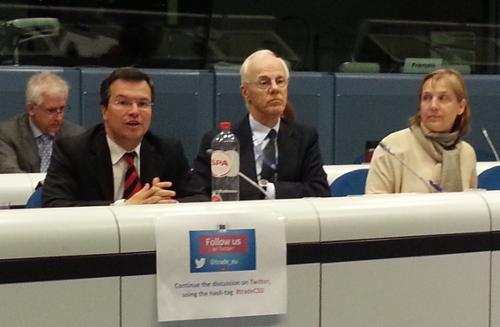 On May 17, 2013, DG trade held a public briefing on the IP Chapter for the TTIP and the E/Japan trade agreement. The TTIP discussion was led by Pedro Velasco Martins, the Deputy Head of Unit for Intellectual Property and Public Procurement. Unlike some recent USTR briefings, which were off-the-record, this was on-the-record meeting, and DG Trade even displayed a suggested twitter hash tag.
On May 17, 2013, DG trade held a public briefing on the IP Chapter for the TTIP and the E/Japan trade agreement. The TTIP discussion was led by Pedro Velasco Martins, the Deputy Head of Unit for Intellectual Property and Public Procurement. Unlike some recent USTR briefings, which were off-the-record, this was on-the-record meeting, and DG Trade even displayed a suggested twitter hash tag.
According to the opening statement by Velasco Martins, the IP chapter in the TTIP will be not be an extensive norm setting agreement. The IP Chapter will focus on such things as coordination for enforcement of rights, and it will not attempt to harmonize the levels of protection upward to the highest levels found in both parties, since that would undermine the balance between right holders and consumers. That said, in the Q&A, there were a number of questions about what would be in or out of the agreement. When asked if the agreement would have a provision on test data protection for pharmaceutical and biologic drugs, or if the term of protection for copyright would be part of the deal, the answer was not conclusive. That would depend upon what the “stakeholders” are able to get parties to table in the negotiations, said Velasco Martins — so it seems as though anything is possible, depending upon the success of the various right holder lobbying efforts.
DG-Trade said it did not know if IP would be included in the Investor State dispute resolution chapter, but noted that IP was included in the investor state provisions for NAFTA and in some other EU agreements.
KEI proposed that the agreement provide for the implementation of cross-border copyright exceptions for persons with disabilities, and asked if DG-Trade anticipated negotiations relating to the recent USDOJ/USPTO joint statement on the importance of limiting injunctions in infringement proceeds where there are patents on standards. DG-Trade did not share opinions on either topic.
In the discussion of the lack of transparency of the negotiating text, KEI asked DG-Trade to find a way to publish periodic versions of the negotiating text, and that we did not expect to see every trial balloon or email, but we should see periodic versions of the text. We noted that none of the trade negotiators were well enough informed to understand the ramifications of some of the text, and that only by giving the general public access would the negotiations benefit from the collective insights of those most knowledgeable.
DG Trade said it did not expect to follow the US model and give hundreds of corporate representatives access to texts, but they clearly understand that this creates two tiers of access, one for people representing multi-billion (pick your currency) companies, and second rate and poorly informed tier for the general public.